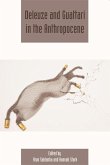This is the first book to use complexity theory to open up the 'geophilosophy' developed by Gilles Deleuze and Félix Guattari in A Thousand Plateaus, Anti-Oedipus and What is Philosophy? The Guide enables readers to grasp the basics of complexity theory (the study of self-organisation and emergence in material systems) while the Glossary eases the difficulty of applying this science to Deleuze and Guattari's often perplexing terminology. Written in a clear style, by a philosopher and a geographer that maintains a practical orientation and an interdisciplinary focus. Deleuze and Geophilosophy is thoroughly pragmatic: it does not inquire into the meaning of earth, but into how it functions. It provides a common conceptual framework for physical and human geographers to work alongside other social scientists, cultural studies practitioners, and philosophers. These interdisciplinary teams explore the entangled flows, lines, grids, and spaces of our world. This book will be of particular interest to those working in disciplines that intersect, for example, culture, nature, space, and history: anthropology, art and architecture theory, communication studies, geography, Marxism and historical materialism, philosophy, postcolonial theory, urban studies, etc. Key Features * Explores a new aspect of Deleuzian thought-'geophilosophy' (geography & philosophy) * The first portion explains the basics of complexity theory * Half of the book is a Glossary which helps readers with Deleuze and Guattari's perplexing terminology * Emphasis on 'bodies politic' in geophilosophy and complexity theory which has never before been linked in such a way








